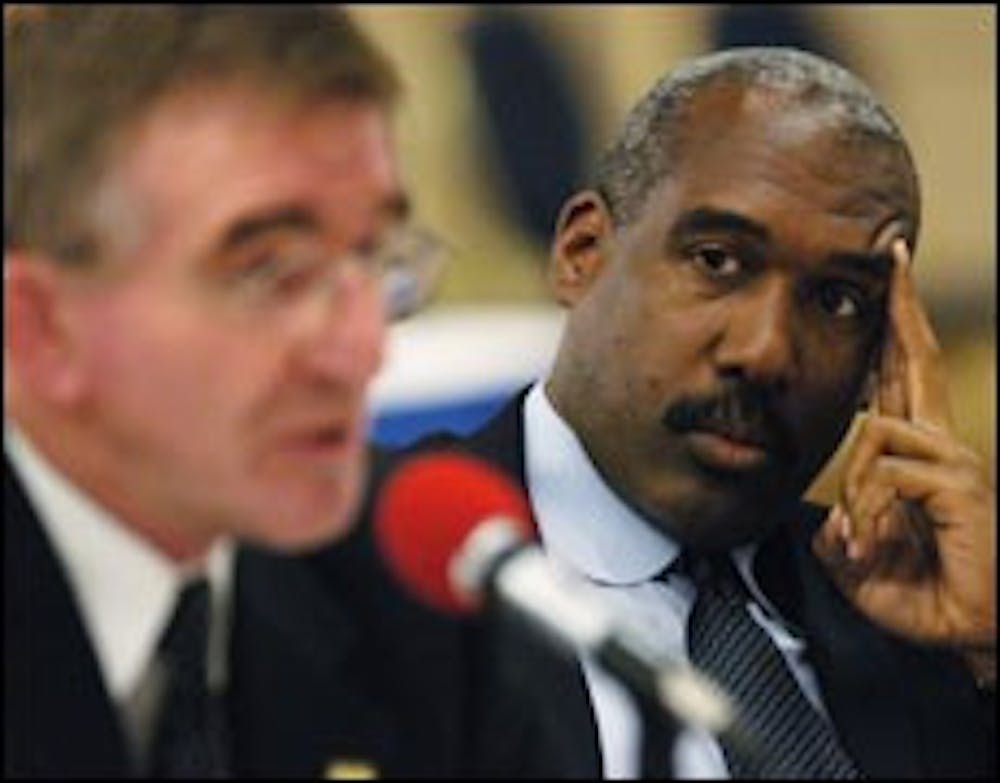TUCSON -- Sun Devil Recruiters may be gone from ASU, but ASU officials aren't done with recruiting reforms just yet.
ASU President Michael Crow and other university presidents have until Dec. 1 to sign and submit to the NCAA a policy for recruiting athletes, said Sandy Hatfield-Clubb, ASU senior associate athletics director.
Hatfield-Clubb described the policy change as part of an update on the status of Intercollegiate Athletics at Arizona's three state universities to the Arizona Board of Regents on Thursday.
In the past few years, the NCAA has enacted a series of reforms on athletics with which ASU and all other universities will have to comply.
Universities' recruiting policies will need to ban drugs and alcohol, among other items, from being used in the process of recruiting new athletes at ASU.
ASU's recruiting policy caused controversy in fall 2002 when a series of articles published in The State Press described the use of underage drinking and sexual behavior as activities involved with a group of female students called the Sun Devil Recruiters.
ASU head football coach Dirk Koetter disbanded Sun Devil Recruiters in March.
UA President Peter Likins, a former member of NCAA's advisory committee, spoke on behalf of NCAA President Miles Brand, who was unable to attend the board meeting.
"Rapidly, the NCAA has charged us with recruiting student athletes the same way we recruit other students," Likins said. "This should help us avoid the celebrity culture that sometimes surrounds recruiting."
Crow said ASU officials are still drafting his policy statement and said he anticipated being able to make his deadline.
The NCAA also created the Student-Athlete Opportunity Fund for the 2003-2004 academic year to provide athletes with financial aid for education, family, health and "institutional academic or programming enhancements," using revenues from sources including televised broadcasts of ASU games, Hatfield-Clubb said.
Another series of policies limits the time demands on multi-sport athletes to the same number of hours they spend practicing and playing games per week as single sport athletes: 20 hours during the season and 8 hours out of season. Athletes must also take two days off per week from athletically related activities during the 8-hour, out-of-season practice period. Universities may pay for student-athletes' medical expenses to allow them to return to competition, instead of paying only for injuries attained on the field.
The policies are aimed at increasing athletes' quality of life and ability to study, Hatfield-Clubb said.
Crow said a student-athlete should be viewed as a "total person," rather than just an athlete.
ASU Athletic Director Gene Smith made his annual report on student-athletes' academic performance to the regents. The same report, describing data gathered in the 2003-04 academic year, was also submitted to the NCAA, and ASU was found to be in compliance with all NCAA rules.
The report states the 6-year graduation rate for all male student-athletes who entered ASU in fall 1997 was 50 percent, while the average for females in the same category was 70 percent -- 58 percent, on average. The average 6-year graduation rate for all students was 52 percent, the report stated.
Crow said the most recent 6-year graduation rates of student-athletes are slightly more than 60 percent, which is roughly 10 percent greater than the rates for the entire student population.
Likins said graduation rate measures are flawed because students who transfer out of ASU are counted as failures, while students who transfer in are not counted at all.
Crow said athletes' graduation rates are harmed by students who choose to go into professional sports before they graduate.
"I happen to be of the opinion that all professional sports should require a degree," Crow said.
Reach the reporter at nicole.saidi@asu.edu.




